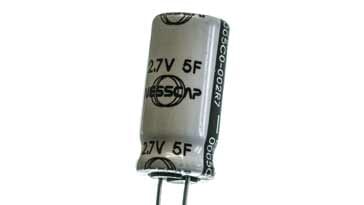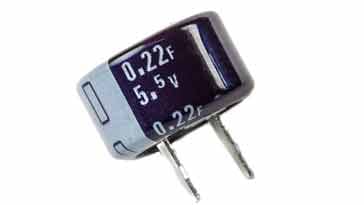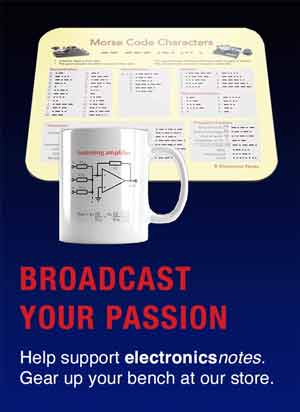Supercapacitors vs. Batteries: A Comparative Analysis
Both supercapacitors and batteries are able to store significant amounts of charge and their applications overlap, but which one is best for your circuit or system design.
Home » Electronic components » this page
Capacitor Tutorial Includes:
Capacitor uses
Capacitor types
Electrolytic capacitor
Ceramic capacitor
Ceramic vs electrolytic
Tantalum capacitor
Film capacitors
Silver mica capacitor
Super capacitor
Supercapacitor vs batteries
Surface mount capacitors
Specifications & parameters
How to buy capacitors - hints & tips
Capacitor codes & markings
Conversion table
Supercapacitor technology has advanced considerably in recent years. This means that super capacitors are being used in areas where batteries might have been considered years ago.
However they are both very different technologies and they reve very different characteristics. This means that it is necessary to take a close look at which technolog best meets the particular needs of the circuit design or system for which they are being considered.
While both super capacitor and batteries store energy, they differ significantly in terms of energy density, power density, cycle life, charging time and other parameters.
Understanding Supercapacitors
Supercapacitors, also known as ultracapacitors, are energy storage devices that store energy electrostatically, rather than chemically like batteries.

They consist of two electrodes separated by an electrolyte. When voltage is applied, ions from the electrolyte migrate to the electrode surfaces, forming an electrical double layer.
This double layer stores energy, which can be released to power electronic devices.
Key Characteristics of Supercapacitors
It is worth looking at the characteristics of supercapacitors to see what their main characteristics are and how they can be utilised to their best.

High Power Density: Supercapacitors can deliver and absorb high amounts of power in a short time, making them ideal for applications that require rapid bursts of energy.
Long Cycle Life: They can withstand a large number of charge-discharge cycles without significant degradation in performance.
Fast Charging and Discharging: Supercapacitors can be charged and discharged very quickly, making them suitable for applications that require frequent energy cycles.
Low Energy Density: Compared to batteries, supercapacitors have a lower energy density, meaning they cannot store as much energy per unit of weight or volume.
Understanding Batteries
Batteries are electrochemical devices that convert chemical energy into electrical energy. They consist of an anode, a cathode, and an electrolyte.
When connected to a circuit, a chemical reaction occurs, releasing electrons and generating an electric current.
Key Characteristics of Batteries
High Energy Density: Batteries can store a significant amount of energy per unit of weight or volume, making them suitable for long-lasting applications.
Moderate Power Density: While batteries can deliver relatively high power, they are generally slower to charge and discharge compared to supercapacitors.
Limited Cycle Life: The number of charge-discharge cycles a battery can withstand before its performance degrades varies depending on the battery chemistry.
Slower Charging and Discharging: Batteries typically take longer to charge and discharge compared to supercapacitors.
Comparison of supercapacitors & batteries
The table below gives a comparison of the main characteristics of supercapacitors and batteries.
| Comparison of Supercapacitor and Battery Characteristics |
||
|---|---|---|
| Parameter | Supercapacitor | Battery |
| Energy density | Low | High |
| Power density | High | Moderate |
| Cycle life | Very long | Limited |
| Charging time | Fast | Slow |
| Self discharge | Low | Moderate to high |
Hybrid Solutions: Combining the Best of Both Worlds
To overcome the limitations of individual technologies, hybrid solutions that combine supercapacitors and batteries are gaining popularity.
These hybrid systems leverage the high power density of supercapacitors to handle peak power demands and the high energy density of batteries to provide sustained power.
Advantages of hybrid systems
It is worth seeing how a hybrid system might worek and what advantages it could offer.
Improved Performance: Hybrid systems can offer a combination of high power density and high energy density, making them suitable for a wide range of applications.
Extended Cycle Life: By reducing the number of deep discharge cycles on the battery, hybrid systems can extend the battery's lifespan.
Faster Charging: Supercapacitors can be charged quickly, allowing for faster overall system charging times.
Applications of supercapacitors &d batteries
Supercapacitors and batteries are used in a huge variety of areas with supercapacitors being used increasingly as their performance improves and the number of applications increases.
Consumer Electronics: Supercapacitors are used in devices like smartphones and tablets to provide short bursts of power for tasks like camera flashes and quick app launches. Batteries are used to power the devices for extended periods.
Electric Vehicles: Supercapacitors can be used to provide regenerative braking energy recovery and peak power assistance, while batteries supply the primary energy for propulsion.
Renewable Energy Systems: Supercapacitors can be used to store energy from renewable sources like solar and wind, helping to stabilize the grid and improve energy efficiency.
Industrial Applications: Supercapacitors are used in industrial applications such as motor control, power backup systems, and energy storage for regenerative braking systems.
Medical Devices: Implantable medical devices often use batteries as the primary power source, while supercapacitors can be used for short-term energy storage and power delivery.
Future trends
As technology continues to advance, we can expect to see further innovations in both supercapacitor and battery technologies. Researchers are working on developing new materials and chemistries to improve the performance and lifespan of these devices.
Additionally, hybrid systems that combine the strengths of both technologies are likely to become more prevalent.
In conclusion, supercapacitors and batteries offer distinct advantages and are well-suited for different applications.
By understanding their characteristics and limitations, engineers can select the appropriate energy storage solution to meet the specific requirements of their designs. As technology advances, we can anticipate even more innovative and efficient energy storage solutions emerging in the future.
 Written by Ian Poole .
Written by Ian Poole .
Experienced electronics engineer and author.
More Electronic Components:
Batteries
Capacitors
Connectors
ADC
DAC
Diodes
FET
Inductors
Memory types
Phototransistor
Quartz crystals
Relays
Resistors
RF connectors
Switches
Surface mount technology
Thyristor
Transformers
Transistor
Unijunction
Valves / Tubes
Return to Components menu . . .




